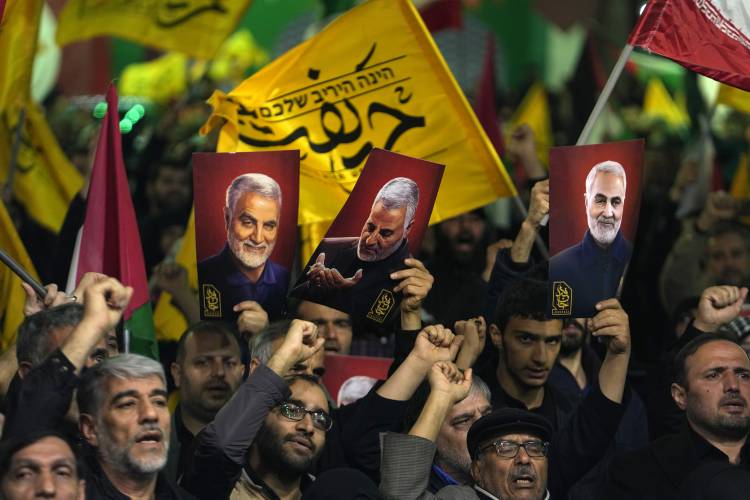Guest columnist Rudy Perkins: Dangerous resolution on Iran

Iranian protesters chant slogans as they hold up posters of the late Iranian Revolutionary Guard Gen. Qassem Soleimani, who was killed in a U.S. drone attack in 2020, during their anti-Israeli gathering to condemn killing members of the Iranian Revolutionary Guard in Syria, at the Felestin (Palestine) Sq. in downtown Tehran, Iran, Monday, April 1, 2024. AP PHOTO/VAHID SALEMI
| Published: 04-25-2024 4:26 PM |
Both the Iranian government’s bombing of Israel and the Israeli government’s bombing of Iran are extremely perilous for the Middle East and the United States. That is why the dangerously one-sided U.S. Congressional resolution, H.Res. 1143, “Condemning Iran’s unprecedented drone and missile attack on Israel,” which the House passed on April 18, was so irresponsible. The resolution amounted to a green light to Israel for more attacks on Iran, and incitement for a wider and more destructive war in the region.
The context for this resolution was the recent exchange of bombings between Israel and Iran. On April 1, the Israeli government bombed the Iranian embassy complex in Syria, killing two of Iran’s generals, as the New York Times and others reported. According to the U.S. State Department: “An attack on an embassy is considered an attack on the country it represents.” So, Israel’s bombing there amounted to bombing Iran.
In retaliation for Israel’s bombing of the Iranian embassy, Iran launched a drone and missile attack on Israel on April 13. As numerous American and international media reported (AP, BBC, CNN, Reuters), this was a retaliatory attack by Iran. Iran’s retaliatory attack caused “slight damage” to Israel’s Nevatim Air Force Base, according to NBC News, but seriously wounded a 7-year old in a nearby Arab Bedouin community, as the New York Times reported.
As Congressional Progressive Caucus (CPC) Chair Pramila Jayapal (D-WA) pointed out, H.Res. 1143 “further escalates the situation at exactly the time that we need to do the opposite. It does not mention the precipitating strike on the Iranian embassy by Israel that led to this attack.” Moreover, the resolution “fully supports Israel’s right to respond to this aggression through military . . . means,” twisting the meaning of the word “aggression,” by using it to describe Iran’s retaliation for Israel’s bombing of the Iranian embassy complex.
Such “full support” likely now ties Congress politically to Israeli Prime Minister Benjamin Netanyahu’s decisions on military responses to Iran — an extremely risky pledge to make. By way of the resolution, the House also “reaffirms the United States commitment to Israel’s security including through … defense sales,” and “stands ready to assist Israel with emergency resupply and other security … support.”
These latter congressional commitments appear to be an attempt to undermine the gradually developing view that military assistance to Israel must be conditional and not a blank check, and they ramp up the potential for a cataclysmic, U.S.-backed war between Israel and Iran. The day after this congressional resolution was passed, in fact, Israel bombed an Iranian military air base outside the city of Isfahan in central Iran, according to reports by The New York Times, the BBC, and others.
H.Res. 1143 was sponsored by Republican Congressman Tom Kean, and 90% of its 45 cosponsors were Republicans. Unfortunately, in the end most congressional Democrats voted with the Republicans on this, including nearly all of the Massachusetts delegation.
Similarly dangerous votes regarding the Middle East are no doubt going to be pushed again in Congress, the kind of bellicose and myopic votes that caused our country to plow blindly into decades of “forever wars” there that killed hundreds of thousands of civilians, thousands of our own young soldiers, and wasted trillions of dollars in resources badly needed in America and the world to build a better future. When such pernicious votes are proposed again, the Massachusetts congressional delegation would do well to listen very carefully to the advice of peace-oriented progressive Democrats, like CPC Chair Jayapal, who voted “no” on H.Res. 1143.
Article continues after...
Yesterday's Most Read Articles
 Sportsman’s Corner: Orange Gun Club’s Kids Derby
Sportsman’s Corner: Orange Gun Club’s Kids Derby
 Orange Selectboard declares armory as surplus property
Orange Selectboard declares armory as surplus property
 Battery storage bylaw passes in Wendell
Battery storage bylaw passes in Wendell
 Debt-burdened UMass students, grads rally for relief
Debt-burdened UMass students, grads rally for relief
 On The Ridge with Joe Judd: What time should you turkey hunt?
On The Ridge with Joe Judd: What time should you turkey hunt?
 1989 homicide victim found in Warwick ID’d through genetic testing, but some mysteries remain
1989 homicide victim found in Warwick ID’d through genetic testing, but some mysteries remain
Rudy Perkins of Amherst, took part in an interfaith peace delegation to Iran led by an American rabbi in 2008, getting to speak with Muslim, Jewish and Christian religious leaders there, and visiting historic Isfahan, Tehran and other Iranian cities.

